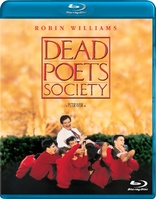Dead Poets Society Blu-ray Movie
HomeDead Poets Society Blu-ray Movie 
Disney / Buena Vista | 1989 | 129 min | Rated PG | Jan 17, 2012Movie rating
7.8 | / 10 |
Blu-ray rating
| Users | 3.7 | |
| Reviewer | 4.0 | |
| Overall | 4.0 |
Overview
Dead Poets Society (1989)
Quiet and shy Todd Anderson has just come to the elite preparatory school where his older brother was valedictorian. His roommate, Neil, although bright and popular, is very much under the thumb of his overbearing father. The two, along with their other friends, meet Professor John Keating, their unorthodox new English teacher, who tells them of the Dead Poets Society and encourages them to go against the status quo and seize each day. Each does this in his own way and is changed for life.
Starring: Robin Williams, Robert Sean Leonard, Ethan Hawke, Josh Charles, Gale HansenDirector: Peter Weir
| Coming of age | Uncertain |
| Drama | Uncertain |
| Period | Uncertain |
| Teen | Uncertain |
Specifications
Video
Video codec: MPEG-4 AVC
Video resolution: 1080p
Aspect ratio: 1.85:1
Original aspect ratio: 1.85:1
Audio
English: DTS-HD Master Audio 5.1 (48kHz, 24-bit)
French: Dolby Digital 5.0
Subtitles
English SDH, French
Discs
50GB Blu-ray Disc
Single disc (1 BD)
Playback
Region free
Review
Rating summary
| Movie | 4.5 | |
| Video | 4.0 | |
| Audio | 3.5 | |
| Extras | 3.5 | |
| Overall | 4.0 |
Dead Poets Society Blu-ray Movie Review
"No matter what anybody tells you, words and ideas can change the world."
Reviewed by Kenneth Brown January 11, 2012Ah, literature. The Ambien of the masses and the bane of high school students everywhere, literature has become a four-letter word in 21st Century America; shoved into the No Student Left Behind corner to make more room for mathematics and science, the stuff of college applications and standardized testing dreams. "Noble pursuits, and necessary to sustain life," no doubt. "But poetry, beauty, romance, love... these are what we stay alive for." Largely misunderstood, the prose and poetry of the past has become a dry, stuffy, humorless chore in the eyes of many educators, which is tragically fitting, I suppose, considering just how many modern readers view such works as dry, stuffy, humorless chores. But open a student's eyes to what literature really is, push past the language barriers and comprehension struggles to the voice and soul of the text, and you'll see a student experience a very real, very powerful connection to the joy, sadness, humor, expression and wisdom of the past. It's the prevailing philosophy of director Peter Weir's Dead Poets Society and, sadly, still terribly relevant today (despite the fact that the film was first released in 1989 and takes place in 1959). Art and academia have long been at war and, if anything, the battle has only intensified over the last twenty-two years. Perhaps the world could use a few more John Keatings...
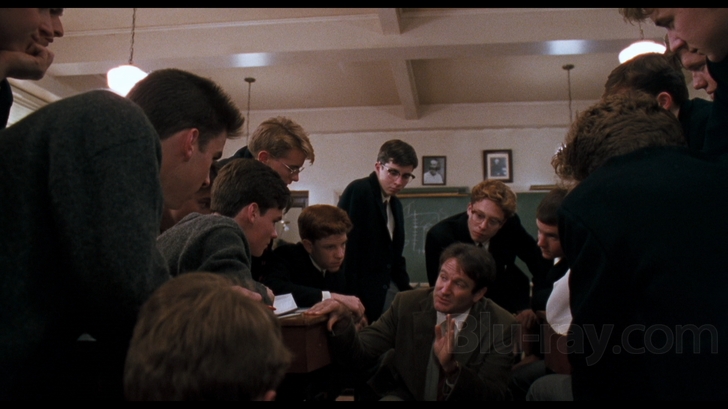
Mr. Keating holds session.
"They're not that different from you, are they? Same haircuts. Full of hormones, just like you. Invincible, just like you feel. The world is their oyster. They believe they're destined for great things, just like many of you. Their eyes are full of hope, just like you. Did they wait until it was too late to make from their lives even one iota of what they were capable? Because, you see gentlemen, these boys are now fertilizing daffodils. But if you listen real close, you can hear them whisper their legacy to you. Go on, lean in. Listen, you hear it? Carpe... hear it? Carpe. Carpe diem. Seize the day, boys. Make your lives extraordinary."
Robin Williams' John Keating is the man every English teacher wants to be, the English teacher every high school student would love to have, and one of cinema's most endearing educators. Credit Weir's command and writer Tom Schulman's Academy Award-winning script all you want, it's deserved, but don't overlook Williams budding mastery of dramatic craft, his refreshing (daring, even, in 1989) restraint as a comedian, and his layered supporting performance as a late 1950s prep school teacher. Wait. Supporting performance? That's right. Dead Poets Society isn't about John Keating at all, although he plays a crucial role in the story. His arc is much more subtle, and much darker than you might notice the first time around: a new Welton Academy teacher attempts to inspire his students to forge their own path, only to experience the satisfaction and the inherent pitfalls of influencing young minds to challenge an established system. (He pushes too hard: "This is a battle, a war, and the casualties could be your hearts and souls!" But then reigns in his rhetoric after noticing a troubling trend amongst some of his impressionable disciples: "Sucking the marrow out of life doesn't mean choking on the bone.") No, Dead Poets Society is the story of a group of Welton Academy boys -- chief among them Todd Anderson (Ethan Hawke), Neil Perry (Robert Sean Leonard), Knox Overstreet (Josh Charles), Charlie Dalton (Gale Hansen), Steven Meeks (Allelon Ruggiero), Gerard Pitts (James Waterston) and Richard Cameron (Dylan Kussman) -- whose lives are changed, redefined and, in some cases, awakened under Mr. Keating's watchful eye.
The then-young actors do an exceptional job channeling the passions, fears and insecurities of adolescence (particularly Leonard, Hawke, Charles, Hansen and Ruggiero), and only the briefest of stage flaws diminish their otherwise honed performances. And while Keating stands as the boys' captain, it's clear Williams had his own following on set. As Neil and his classmates adopt Keatings' mannerisms, expressions and hunger for life, resurrecting a secret club Keating led as a student himself, Leonard and his castmates subconsciously take their cues from Williams and grow as actors as much as their characters grow as human beings. (For a darker but equally effective trip down the Keating rabbit hole, watch the film while taking note of his slow realization that, in encouraging his students to think for themselves, he's actually encouraged some of them to simply emulate him. Tragedy ensues, a man is humbled, and both teacher and students learn the dangers of wallowing in extremes.) Weir allows a few moments of Williams' patented rapidfire zaniness to creep in but, free from pop culture references and celebrity impressions, it isn't jarring or egomanical as his screen riffs and rants sometimes are. Like the boys, Keating is soulful, eager and searching, and Weir strikes a wonderful balance between teacher and student, offering just enough scenes between Williams and his intellectual wards to create unbreakable bonds and memorable relationships. Even when Williams is off camera, the true stars of Dead Poets Society hold their own. There isn't a moment where Williams' presence is missed or, vice versa, his presence becomes an irritation. Likewise, there isn't a moment where the boys' antics become overbearing, annoying or a hindrance to anything Weir or Schulman are aiming to accomplish.
In the hands of another director, Dead Poets Society might have been a saccharine coming-of-age melodrama. But Weir shows as much measured restraint as Williams, avoiding easy takes, subverting tear-jerker contrivances, and staging one of the more moving third acts in the "inspirational teacher" subgenre. Hawke's shyness and Leonard's experiements in extroversion are gripping rather than conventional, Williams' comedic flourishes are judiciously integrated, pacing and plotting brush perfection, character is king, performances are guided, and trickier elements like a student's suicide are handled with a deft hand. Even the climactic "O Captain, my Captain" scene -- a shock to the system that would certainly cause eyes to roll if employed any other way -- is a powerful culmination of every emotional and thematic beat that precedes it. John Seale's misty-morning cinematography, Schulman's dialogue and production designer Wendy Stites' attention to period detail are essential to the timeless quality of the film as well, and it plays every bit as well today as it did in 1989. Granted, Dead Poets has drawn its share of criticism. It's a thinly veiled Robin Williams vehicle, Keating offers his students little more than a series of hyperbolic literary platitudes, or Weir and Schulman's message is to rebel against the system at all costs. But none of these criticisms hold water -- the boys are given too much attention for it to be a Williams vehicle, Keating's classes are always presented as a Greatest Hits framing device for the events that follow, and Weir and Schulman provide plenty of counterbalance to any sense of enabled rebellion -- and, frankly, miss the point entirely. Dead Poets Society is an extraordinary film filled with extraordinary moments and extraordinary performances. It's also a personal favorite, so take that statement as you will. As far as I'm concerned, though, there isn't anything ordinary about it.
Dead Poets Society Blu-ray Movie, Video Quality 
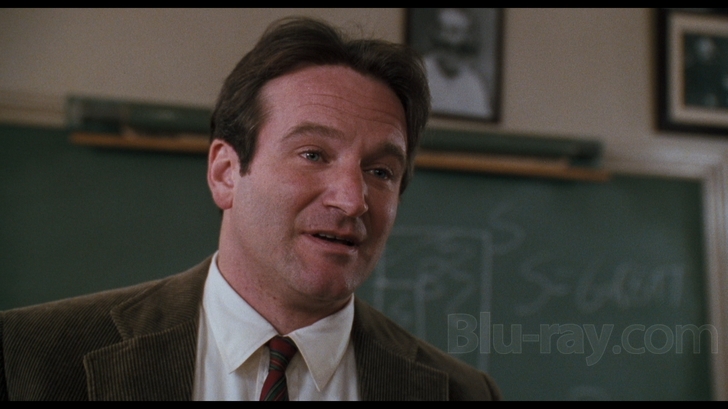
First things first: Dead Poets Society is a somewhat softer catalog title. There are many shots that reveal excellent detail, but there are also others that aren't so lucky. Disney, though, has done their due diligence and produced a filmic 1080p/AVC-encoded video transfer that represents, for better or worse, Weir and Seale's every intention. Fine detail is faithful to the source, grain has been preserved (no egregious noise reduction here) and, barring a few negligible instances of ringing, edge definition is clean and relatively refined. Seale's palette isn't what some of you might expect either, as it relies on a variety of autumnal grays and stoic earthtones to set the stage for Weir's prep academy drama. But that isn't to say the film lacks primary punch. Vivid yellows and reds grace Knox's visit to Chris's public school, a warm sun occasionally rises on lush green hills, the Noels' home is rich and ornate, Keating's soccer sessions are beautifully saturated, and even the chilliest classroom meetings feature natural, lifelike tones. Black levels are nice and deep throughout, even if delineation suffers every now and again; and skintones are quite lovely, even though faces are a bit too pink at times. The encode itself is impressive as well, without any artifacting, banding, aliasing or anomalies to point to (aside from some inherent crush, primarily involving the Dead Poets' cave). All in all, Dead Poets Society remains true to its source. Disney could have artificially sharpened and smeared the bejesus out of Seale's photography. Instead, the studio has taken the path less traveled and, for the most part, honored the filmmakers' vision.
Dead Poets Society Blu-ray Movie, Audio Quality 
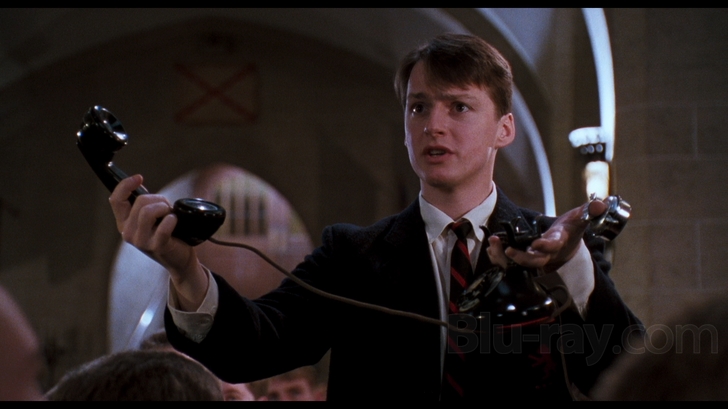
Disney's DTS-HD Master Audio 5.1 surround track doesn't sound its barbaric yawp over the rooftops of the world, but as twenty-two-year old catalog classics go, the studio's lossless efforts are satisfying. Dialogue is bright, clear and perfectly intelligible (hit-or-miss ADR notwithstanding) and effects, great and small, are neatly prioritized in the mix. That said, Dead Poets Society is largely a front-heavy affair; by the nature of its original sound design in part, but also because of a subdued approach to rear speaker activity. Caves unfortunately sound too similar to classrooms (although both feature unique acoustic qualities), outdoor voices and indoor voices aren't so different from one another, and directionality is limited. That said, the soundfield is still reasonably immersive, LFE output still makes its presence known on occasion, and dynamics are decent (again, especially for a twenty-two-year old film). Dead Poets Society's video trumps its audio, but fans of the film will be quite pleased nonetheless. The Blu-ray edition's AV presentation is dramatically better than its DVD counterpart, even when it seems like that might not be the case, and even the briefest of side-by-side comparisons reveal just how much of an upgrade this new release provides.
Dead Poets Society Blu-ray Movie, Special Features and Extras 
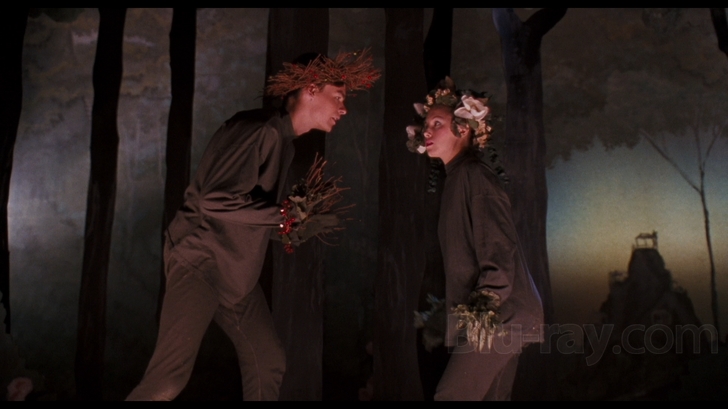
- Audio Commentary: Director Peter Weir, cinematographer John Seale and writer Tom Schulman offer a candid but restrained commentary that hits on everything from the development of the script to changes made on the fly (Keating's original entrance and the now iconic Carpe Diem scene were originally a bit different), the inspirations behind many a scene, details on casting and performances, notes on lighting and sound design, a rundown of writing authentic period dialogue and creating convincing '50s production design, and essentially anything and everything filmfans might want to know. It's a touch too tip-toey at times, and would have been much more engaging if Weir, Seale and Schulman hadn't been recorded separately, but it isn't dry and overtly technical either, making for a good listen and an insightful commentary.
- Dead Poets: A Look Back (SD, 27 minutes): Key members of the Dead Poets cast, young and old alike, take a look back at the film and the experience of making it, offering awe-struck praise of Weir as a filmmaker, personal memories from the shoot, and other stories fans of the film will eat up. While it was produced for the 2006 Special Edition DVD release, while Robin Williams is nowhere to be found, and while it's presented in 4:3 standard definition, it's still a engrossing feature that's well-worth watching.
- Raw Takes (SD, 8 minutes): Raw, unedited takes of a single deleted scene that was designed to intercut with a young man's suicide. Weir made a smart decision leaving the sequence out, though, as it would have probably robbed the death of some of its punch.
- Master of Sound: Alan Splet (SD, 11 minutes): Weir and filmmaker David Lynch discuss the life, career and cinematic contributions of the late Academy Award-winning sound designer, Alan Splet.
- Cinematography Master Class (SD, 15 minutes): Seale talks about the impossibility of perfection before a narrator takes over and nearly spoils the entire thing. There's still plenty of interesting info to be had, as Seale reveals his approach to setting up the same shot with a variety of different variables, but the entire overview would have been much better coming from Seale himself. (And without the aquarium-tour music, which comes and goes as it pleases.) Thankfully, Seale talks to his Master Class students while setting up faux-shots, giving him plenty of opportunity to explain exactly what he's doing and why.
- Theatrical Trailer (SD, 3 minutes): The film's initially misleading theatrical trailer rounds out the package.
Dead Poets Society Blu-ray Movie, Overall Score and Recommendation 
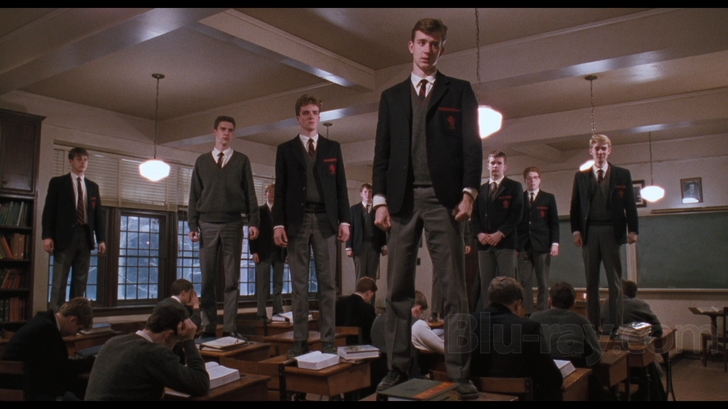
To quote from Whitman, "O me! O life! Of the questions of these recurring; of the endless trains of the faithless... of cities filled with the foolish; what good amid these, O me, O life?" Answer. That you are here. That life exists. That the powerful play goes on, and you may contribute a verse. That the powerful play goes on... and you may contribute a verse. What will your verse be?
Of all the films announced for Blu-ray release in the first quarter of 2012, Dead Poets Society was the one I was most excited about. It's a personal favorite, one I've treasured since high school, but it's also a terrific film, a Peter Weir specialty. Williams and his young co-stars are excellent, the script, performances and cinematography are wonderful, and I challenge anyone to sit through the entire film with a stone face and a cold heart. As decades-old catalog releases go, Disney delivers with a faithful, filmic video transfer, a solid DTS-HD Master Audio 5.1 surround track and a nice selection of special features. A new retrospective documentary or cast commentary would have been most appreciated, but it hardly matters, particularly when Dead Poets Society is being made available at such an accessible pricepoint. So rip those old DVDs out of your collection and add this one to your shopping carts or wish lists post haste.
Similar titles
Similar titles you might also like

Lady Bird
2017

Less Than Zero
1987

I'm Not Ashamed
2016

White Bird in a Blizzard
2014

Almost Famous 4K
2000

My So-Called Life: Complete Series
1994-1995

The Perks of Being a Wallflower
2012

Everybody Wants Some!!
2016

To Sir, with Love
Limited Edition to 3000
1967

Me and Earl and the Dying Girl
2015

Moonlight 4K
2016

Sing Street
2016

Very Good Girls
2013

The Virgin Suicides 4K
1999

American Graffiti 4K
50th Anniversary Edition
1973

Good Will Hunting
1997

East of Eden
1955

The Man Without a Face
1993

Boyhood
2014

An Education
2009
